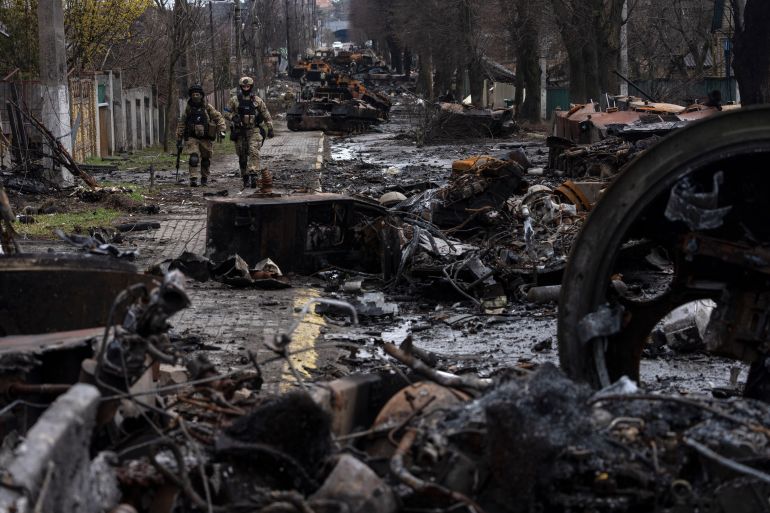ICMD: A new tool to end impunity for those who violate the rules of war
A new initiative by RWI promises to revolutionise the way compliance with the rules of war is monitored globally.
Published On 24 Oct 202424 Oct 2024In this April 3, 2022 file photo, Ukrainian soldiers are seen walking amid destroyed tanks in Bucha, in the outskirts of Kyiv, Ukraine, where invading Russian troops were accused of multiple international humanitarian law violations. [AP Photo/Rodrigo Abd]
In August 1864, a small group of nations adopted a convention in Geneva, Switzerland aimed at ameliorating the condition of the wounded in war. The First Geneva Convention laid the foundation for the legal framework referred to as international humanitarian law (IHL). Also known as the “rules of war”, IHL seeks to reduce the harms resulting from armed conflict by restricting the methods and means of warfare.
However,160 years after the adoption of the First Geneva Convention, we still witness systemic violations of IHL, with devastating consequences for millions of people affected by armed conflict around the world.
Indeed, ensuring broad compliance with IHL has proved to be an arduous task. Despite the existence of robust legal frameworks, the lack of political will and effective mechanisms to hold violators accountable has led to widespread impunity. This impunity is not only undermining the rule of law at national and international levels, but also perpetuating cycles of violence and suffering.
Thus, international bodies concerned with upholding IHL, such as the International Committee of the Red Cross (ICRC) and the United Nations, have long been advocating for stronger compliance mechanisms.
At its 32nd international conference in 2015, for example, the ICRC, backed by the Swiss government, proposed a resolution that would create a regular meeting of states for reporting IHL compliance. The hope was that the meeting could provide states with a “safe space” to discuss IHL implementation away from political pressures and push for accountability and compliance. The proposal, however, did not receive adequate support from states, and was not instituted.
The states’ persistent refusal to adopt a mechanism to monitor IHL compliance has significant implications for victims of armed conflict. The lack of accountability undermines the rule of law, makes the protection of the civilian populations more difficult, and hinders humanitarian aid operations in active conflict zones.
Thus, there is an urgent need for an independent compliance monitoring system to be established that can track and report on potential violations of IHL.
The way forward for IHL compliance, inspired by the past
Raoul Wallenberg, Sweden’s special envoy to German-occupied Hungary during World War II, saved tens of thousands of Hungarian Jews from Nazi persecution by providing them with protective passports and sheltering them in buildings that he declared as Swedish territory. Wallenberg’s efforts went beyond his diplomatic mission; he showed profound compassion, humanity, and determination. His actions have left a lasting legacy and are a powerful example of moral courage and the impact one individual can have in the face of evil.
In 1984, the Raoul Wallenberg Institute of Human Rights and Humanitarian Law (RWI) was established at Sweden’s Lund University to honour his legacy and “contribute to a wider understanding of, and respect for, human rights and international humanitarian law”.
Today, as the promises of “never again” made after World War II appear to be forgotten, and as horrors of war continue to plague humanity in Sudan, Gaza, Ukraine, Syria, Colombia, Yemen, Myanmar, Mali, Lebanon and elsewhere, RWI has embarked on a groundbreaking initiative that promises to revolutionise the way we monitor compliance with IHL.
RWI is establishing a new academic research initiative, named the IHL Compliance Monitoring Database (ICMD), which aims to become a cornerstone of the global architecture that upholds the principles of IHL. RWI and its partners, using the latest technologies, will systematically gather, aggregate, and document global data on alleged IHL violations and present this information on a single accessible platform. Using machine learning technologies, the ICMD will also be able to gather and analyse open-access information to produce high-quality reports on potential violations of IHL.
The global coverage provided by the ICMD will enable the analysis of trends within and across armed conflicts, offering crucial insights for policymakers, practitioners and researchers. From this wealth of credible information, ICMD will be able to produce world-class IHL compliance monitoring analysis. This work will not only promote awareness and knowledge of IHL, but also support policy discourse and advocacy for deepened respect of IHL at the highest levels.
The ongoing failure to uphold IHL poses a grave threat to global peace and security. But the time to act is now. States must rally behind initiatives like the ICMD and commit to strengthening IHL monitoring mechanisms. As citizens, we too have a role: to pressure our governments to prioritise IHL and demand better implementation and enforcement.
The road ahead is long and challenging, but with concerted efforts and a commitment to justice, we can make significant strides towards a more humane and just world. The ICMD initiative embodies this spirit, offering a powerful tool to ensure that alleged IHL violations are systematically documented to support efforts to counter impunity, restore the rule of law and repair the harms done to the victims.
Let us draw inspiration from Wallenberg’s courage and dedication, and put our support behind this noble and essential initiative, knowing that strong forces still seek to undermine IHL’s goal of limiting the harms of war.
The views expressed in this article are the authors’ own and do not necessarily reflect Al Jazeera’s editorial stance.
